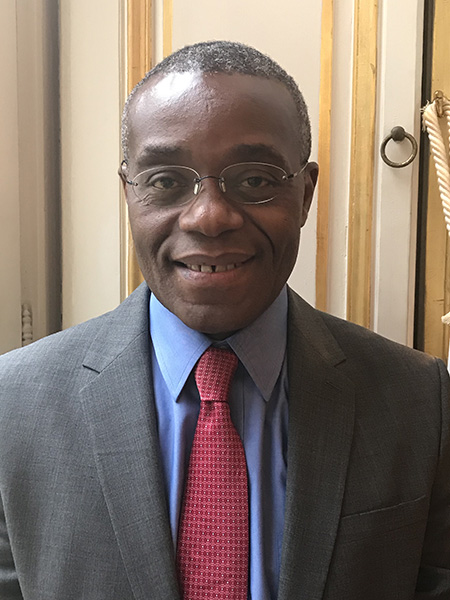THE academic board
How can the reality of four centuries of relations between France, Africa, the Americas, the Caribbean and the Indian Ocean and the mark they have left on the contemporary world be better known? That is the challenge to which the Academic Board helps the Foundation rise.
Composed of 40 experts under the chairmanship of Romuald Fonkoua, the Academic Board brings its expertise to the Foundation's team for the production and distribution of knowledge about slavery and its legacies, and, along with the Advisory Board, provides useful advice on governance. A jury within the Foundation awards the thesis prize each year.
Organized into thematic working groups, the Board contributes to defining and implementing the Foundation’s research, education et culture. The groups are:
-
Educational program
-
Academic events
-
Support for cultural creation and heritage
-
Support for research
STATEMENT OF THE ACADEMIC BOARD
The Academic Board of the Foundation for the Remembrance of Slavery, having gathered at its third plenary session on 23 November 2020, has unanimously adopted the following :
Statement by the scientific committee of the Fondation for the Remembrance of Slavery on the importance of research on colonial slavery and its afterlives
A MESSAGE FROM THE CHAIRMAN OF THE ACADEMIC BOARD

Romuald Fonkoua
Chairman of the Academic Board
The originality of the Foundation for the Remembrance of Slavery is to open the national narrative up to the essential place of slavery and to engage French society in better recognition of slavery’s legacies.
This originality is the result of the following threefold observation: an observation of ignorance of this history in most of French society; an observation of incomprehension, of the influence of a certain historical past on the present; an observation of mistrust, in relation to a history that can refer to guilt or victimisation. The Foundation for the Remembrance of Slavery’s mission is to link memory to history, culture and citizenship.
The role of the Foundation for the Remembrance of Slavery‘s Academic Board is to enable dialogue, through the broadest academic means, between history and culture in order to promote more inclusive citizenship. These means are varied. In addition to the history itself, which must always be studied more deeply and whose objects must be renewed, other forms of knowledge – literary, artistic, legal, etc. – which are fully relevant to the understanding of slavery, should be welcomed, in order to broaden the modalities of its narrative (music, videos, etc.) and communication.
The composition of the Academic Board reflects these concerns. Pluridisciplinary, it brings together historians specialized in the West Indies, the Caribbean, French Guiana and the Indian Ocean, 18th-century France and more, specialists in other forms of slavery (from North Africa, for example) and other remembrances, art historians, literary historians, etc., as well as specialists in the history of slavery and its legacies. International, it calls on specialists in these questions who teach in African, English and American universities. Their highly respected work in their respective fields will inform how the Foundation intends to partner with information-distribution organizations established by institutions of public education.
Ultimately, encouraging and promoting national and international academic research on the subject of slavery in the broadest range of disciplines, contributing to the awareness of its legacy in the broadest range of fields, and encouraging sharing its knowledge with the broadest and most varied audiences, both in continental France and the overseas territories are the missions of the Academic Board.
40 RESEARCHERS AND ACADEMICS
- Claire Andrieu : World War II History
- Magali Bessone : Philosophy
- Audrey Célestine : Political Sciences
- Maryse Condé : Literature
- Catherine Coquery-Vidrovitch : African history
- Myriam Cottias : History / Memories of slavery
- Antonio de Almeida-Mendes : History of Lusophone Slavery
- Charlotte de Castelnau-l'Estoile : History / South America
- André Delpuech : Archeology
- Isabelle Dion : History / ANOM
- Marcel Dorigny : History / Slavery
- Prosper Eve : History/ Reunion Island
- Benoit Falaize : History /Education Sciences
- Charles Forsdick : Literature
- Cécile Fromont : History of Art
- Malick Ghachem : History, Law
- Véronique Grandpierre : Academic Inspector for History and Geography, Paris Academy
- Jean Hébrard : History / Atlantic Slavery
- Isabelle Hidair-Krivsky : Anthropology / French Guiana
- Paulin Ismard : History / Ancient Slavery
- Françoise Janier-Dubry : IGESR, Slavery Referent Ministry of National Education
- Anne Lafont : History of Art
- Alain Mabanckou : Literature
- Bruno Maillard : History / Reunion Island
- Achille Mbembe : History, Political Science
- Bernard Michon : History / Nantes
- Jean Moomou : History / French Guiana
- Thomas Mouzard : Anthropologist / Ministry of Culture
- Pap Ndiaye : History / African-Americans
- Olivette Otele : History, Bristol University
- Yolaine Parisot : Literature
- Frédéric Régent : History / Colonial slavery
- Laurella Yssap-Rinçon: Art History
- Dominique Rogers : History / Colonial Slavery
- Jean-Pierre Sainton : History / colonial slavery
- Eric Saugera : History / Bordeaux
- Eric Saunier : Senior Lecturer in Modern History at the University of Le Havre
- Ibrahima Thioub : History, UCAD Dakar
- Salah Trabelsi : History / North African Slavery
- Françoise Vergès : Political Science
